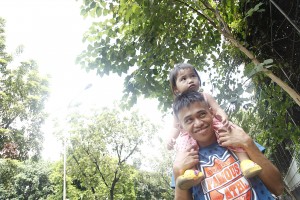
“Nalayo ako sa kulungan, nawala ako sa kalsada, at nakapagtrabaho. Naging maayos ang buhay ko. Dati nilalayuan ako ng tao, ngayon ay nirerespeto na rin po (I was saved from prison, taken off the streets, and given a job. My life finally had direction and I have earned the respect of other people).”
This is how formerly homeless Rolly Cuaderno, 26, desribes the impact of the Modified Conditional Cash Transfer for Homeless Street Families (MCCT-HSF) of the Department of Social Welfare and Development (DSWD) in his life.
More than the financial assistance he and her two-year old daughter Romalyn have received from the program, he credits MCCT-HSF for giving them back security, dignity and respect.
“Noong nasa kalsada ako, sinasabi ng marami na huwag akong lapitan kasi mandurukot daw ako. Ngayon ay may trabaho na ako at malinis na ang aking bihis. Hindi na sila naiilang na lumapit sa akin (When I was still on the streets, most will will discourage others to approach me as they say I am a thief. Now, I have work and dress neatly. They do not anymore hesitate to approach me anymore),” recalled Ronnie, who was reached out with his daughter by DSWD personnel in May 2014 in Barangay Laging Handa, Quezon City.
Rolly’s life before the program was chaotic and unstable. He used to be a parking attendant in Timog, Quezon City. However, during tough times when his earnings did not suffice to put food on the table, he resorted to stealing. This led to him being in and out of jail.
The program has served as a refresh button for him to start anew – new perspective in life and new priorities.
As a first step towards change, Rolly made it a point to regularly attend the Family Development Sessions (FDS).
FDS serves as a venue where topics on effective parenting, husband and wife relationships, child development, laws affecting the Filipino family, gender and development, and home management are discussed. Through the FDS, parents are also informed of their rights as individuals as well as the obligations that they need to fulfill in their family and communities.
For Rolly, the lessons he learned from the FDS have enhanced his paternal capabilities, especially that he is raising his daughter single-handedly. Rolly and his wife have parted ways. Financial problems have strained the couple’s relationship. Nonetheless, Rolly was admired by his fellow MCCT-HSF beneficiaries for taking on the role of both father and mother to Romalyn.
He also learned from the FDS that solo parents like him have rights and benefits under the law, such as livelihood support, that are provided by the local government units.
His inclusion in the Cash-for-Work (CFW), a component of MCCT-HSF, also paved the way for more positive changes in his life. The CFW gave him a steady source of income that enabled him to provide for his daughter.
Difficult youth
From childhood up to the time he was reached out by the DSWD, Rolly considered the streets of Quezon City as his home and workplace.
“Mula nang mamatay ang lola ko nu’ng ako ay pitong taon pa lang hanggang mag-26, kung saan-saan ako nakitira at nakitulog. Sabi ko sa sarili ko, gusto ko na ring magkaroon ng matatawag na bahay. Ito lang ang simpleng pangarap ko (Since my grandmother died when I was seven years old up until I reached the age of 26, I had no place to go home to and sleep in. I told myself, I would want to have a house of my own. This is my simple dream),” Rolly shared.
Rolly realized that staying in the streets is just too dangerous especially now that he has a child.
“Isang gabi na natulog ako sa tabi ng tindahan ng burger ay binagsakan ako ng bangko ng isang taong napadaan lang naman. Hindi ko ‘yon makakalimutan (One night while I was sleeping near a burger stand, a random pedestrian threw a bench at me. I will never forget this),” Rolly recalled.
Now staying in a decent house provided through the Alternative Family Home, another component of the MCCT-HSF, Rolly is confident that he and his daughter are already safe from all kinds of street hazards.
All his fears and apprehensions are gone. He is truly filled with joy and gratitude to the program.
“Masayang-masaya talaga ako noong nakapasok ako sa programa. Dati, karton at mga tagpi-tagping sapin lamang ang higaan naming ni Romalyn. Ngayon, nakakahiga na kami sa isang buong higaan (I am really happy that I became part of the program. Before, Romalyn and I would just sleep on pieces of carton and cardboard. Now, we can sleep comfortably on a bed),” Rolly enthused describing his and daughter Romalyn’s present condition in their new home.
Rolly is just one of the 4,043 beneficiaries of MCCT-HSF in the National Capital Region (NCR) who have been helped by the program.
DSWD-NCR conducts regular reach-out to street dwellers for possible inclusion in the MCCT-HSF. ###


